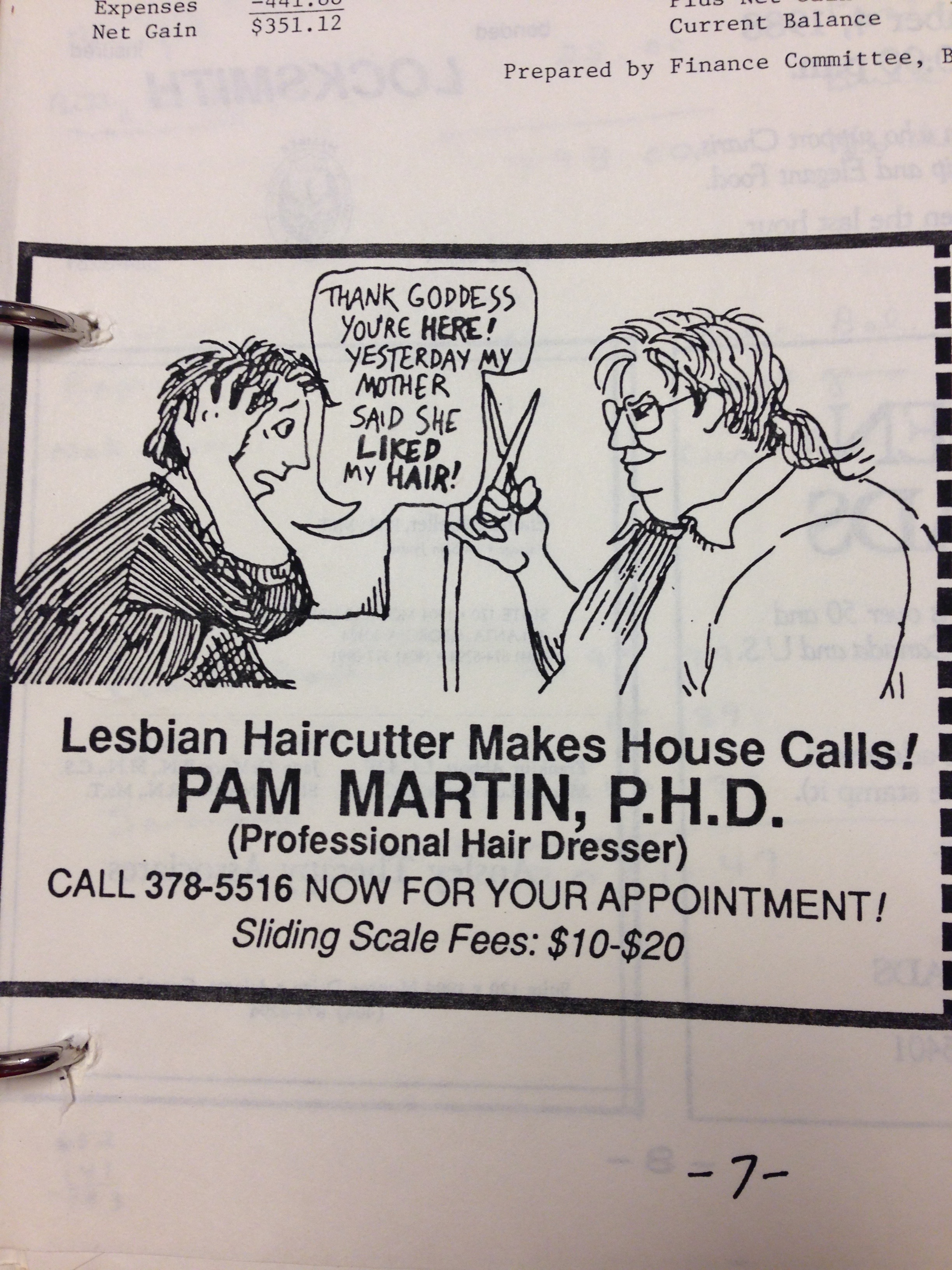Post contributed by Hanne Blank, recipient of a Mary Lily Research Grant from the Sallie Bingham Center for Women’s History and Culture.
In 1976, the year of the American Bicentennial and countless celebrations thereof, the D.A.R. set forth a Bicentennial Declaration, a four-page statement of its beliefs. In it, they took American culture and American men to task for dozens of crimes and misdemeanors perpetrated against womankind, calling “for an end to the conspiracy against women by the Man’s church and the Man’s state… the destruction of patriarchy, the rule of men over women.”
If this doesn’t sound much like the D.A.R. you’ve heard of, there’s good reason: this proclamation wasn’t issued by the Daughters of the American Revolution, but by a cadre of firebrand lesbian feminists – Dykes for an Amerikan Revolution — who cheerfully reclaimed the über-Establishment group’s acronym for themselves. Far from wanting to celebrate some elite patrimony, this D.A.R. wanted “full power to levy war against sexism, racism, classism and all other oppressions…with a firm reliance on the strengths of our pioneer foremothers and sisters, reborn in us, as lesbian feminists.”
The D.A.R.’s “Lesbian Feminist Declaration of 1976” is just one of many lesbian feminist manifestos, mission statements, memoirs, and utopian missives tucked into the papers of the Atlanta Lesbian Feminist Alliance (ALFA), bright traces of an era not so very long ago where many second-wave feminists, not just the D.A.R., engaged in a very different American experiment.
Riffling through ALFA’s papers is a deep dive into this social and political moment. Even a cursory tour through the twenty-some years of ALFA’s newsletters, pamphlets, and papers overwhelms the researcher with a sense of a tight, sometimes contentious community full of heady politics, plans, and personalities. It is surprisingly seductive. I did not approach the ALFA papers to research the group itself – I research feminist health care in the South, and was looking specifically to find out the extent to which it might’ve been part of the concerns of the lesbian community in Atlanta’s 1970s and 1980s – and yet in a matter of hours I fell headlong down the proverbial rabbit hole.
Imagine, if you will, a rented clubhouse to which any member could – by arrangement – get a key. A woman, or a group of women, might unlock the doors of the ALFA house to visit the ALFA library, hold a meeting, convene a coven, or put together a potluck. Imagine the voices, the laughter, the intensity of a small house full of passionate, thoughtful, iconoclastic, sometimes hot-headed women learning, organizing, and socializing.
In the pages of ALFA’s newsletters, notes, and other documents, we see Atlanta’s lesbian feminists dancing until they dropped at monthly Boogie Women dances and furiously typing up newsletters that featured complete monthly rosters of women’s events from concerts to consciousness-raising groups. In what seems a perpetual whirlwind, ALFA women simultaneously created, curated, and celebrated a burgeoning by-women-for-women culture: women-owned restaurants, feminist therapy collectives, women’s self-defense classes, lesbian sexuality workshops, dyke softball tournaments, DIY gynecology seminars, political rallies, community debates over subjects like butch/femme and BDSM. Even the ads placed by community businesswomen were, like this one, definitely and defiantly, sometimes hilariously, lesbian feminist.

Lesbian feminist culture and community was ALFA’s raison d’etre. As such, it often wrestled with questions of separatism. Here and there in the newsletters and other papers we can trace discussions about whether separatism was crucial to lesbian identity and survival or not, whether lesbian-identified and straight-identified women’s loyalties were too different for them to truly share political goals, let alone cultural space.
But separatism was not always something that sprang out of an “us versus them” mentality. Just as often, what motivated the conversation seems to have been sincere curiosity. Like the D.A.R. — whose 1976 manifesto made its way into ALFA’s files via the era’s mimeographed, photocopied, and snail-mailed networks of feminist activist work and writing –the women of ALFA wondered what women’s lives, and lesbian lives, might be like if women had an alternative to living in a (racist, ageist, ableist, classist, capitalist) patriarchy.
If it could be escaped, maybe women would be able to access an “ovarian intellect” without the customary overlay of “male-functionalization” they perceived in their lives and thoughts. Perhaps then women would be able to express themselves and their genders (to say nothing of their sexual desires) in genuine freedom, without falling into the tropes and traps of patriarchy. As they struggled, strategized, and partied together, the Atlanta Lesbian Feminist Alliance, like so many other women’s communities across the country, was engaged in constant experimentation. Atlanta’s lesbian feminists pushed boundaries, their own as well as the wider world’s, as they wove their webs of women’s community out of little more than motherwit and the desire to see if they could.
As with the world-transforming aspirations of many other 1970s radicals, ALFA eventually sputtered out. It folded in the early 1990s, victim of the AIDS crisis and the cultural and economic retrenchment of the Reagan years. But as the newsletters, the flyers, and the meeting minutes in ALFA’s papers tell it, ALFA was full of stalwart, soulful daughters of a distinctively American revolution.
Hanne Blank is an historian and writer of numerous books including Straight: The Surprisingly Short History of Heterosexuality (Beacon Press, 2012) and Virgin: The Untouched History (Bloomsbury, 2007). Currently a Ph.D. candidate at Emory University, she researches the history of feminist and womanist health in America’s Deep South during the 1970s and 1980s and is additionally at work on a book entitled FAT.


